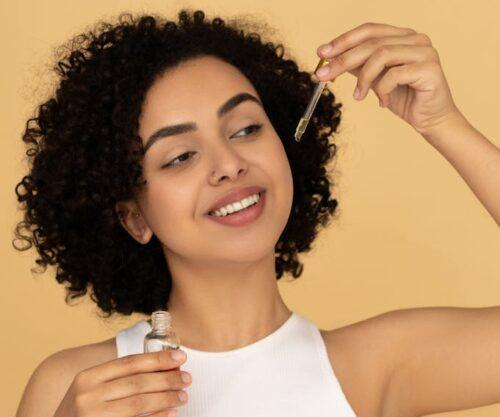
When it comes to hair care, the market is flooded with promises! Serums, oils, masks, and treatments all claiming to deliver luscious, healthy locks.
But recently, a new player has entered the chat – hair peptides. They’re gaining buzz for good reason…
Could peptides be the secret weapon in your hair growth journey? Here’s what you need to know – including what hair peptides are, how and whether they really work for hair growth, and what they combat.
What are hair peptides?
Peptides are short chains of amino acids, the building blocks of proteins. Your hair primarily comprises keratin, a protein, and peptides, which help form and maintain that structure.
In skincare, peptides have long been praised for their ability to firm and rejuvenate the skin—but now they’re making waves in the world of haircare, too.
Hair peptides are specialised molecules formulated to support the scalp and follicles, stimulating growth, strengthening the hair shaft, and potentially even reducing hair loss.
They’re typically found in serums, sprays, and leave-in treatments.
How do peptides work for hair growth?
Peptides in hair products work by:
-
Stimulating blood circulation to the scalp, which helps nourish hair follicles.
-
Signalling the body to produce more keratin, which strengthens the hair strand.
-
Supporting collagen production, which improves the overall health of the scalp.
-
Extending the anagen (growth) phase of the hair cycle, which may result in longer and thicker strands over time.
One of the most talked-about peptides for hair is Copper Tripeptide-1, known for its ability to reduce inflammation, improve follicle size, and support healthy hair growth. Others, like Acetyl Tetrapeptide-3 and Biomimetic peptides, also show promise in strengthening thinning hair and preventing breakage.
Are hair peptides really the secret to hair growth?
While peptides can’t perform miracles overnight, research and anecdotal evidence suggest they do play a meaningful role in promoting healthy hair growth, especially when used consistently as part of a broader routine.
Here’s what makes them stand out:
-
They’re gentle: Unlike harsh chemical treatments, peptides are typically well-tolerated by most skin types and can be used daily.
-
They target the root (literally): Peptides focus on scalp health, which is key to unlocking long-term hair growth.
-
They’re versatile: Whether you’re dealing with thinning, shedding, or just want a little extra volume, peptides can support a wide range of hair goals.
Who should try hair peptides?
If you’re experiencing any of the below symptoms, peptides might be worth adding to your routine:
-
Thinning hair
-
Hair loss due to stress, hormonal changes, or age
-
A weak or itchy scalp
-
Breakage or slow growth
Look for peptide-rich products that are free from sulphates and silicones. Pair them with scalp massages, a balanced diet, and reduced heat styling for best results.
Are hair peptides worth the hype?
Hair peptides aren’t magic as mentioned—but they are backed by science, and they may just be the missing link between your current routine and the results you’re after. Like most things in beauty, consistency is key. Over time, with regular use, peptides can help create a scalp environment that supports thicker, stronger, and healthier hair.
So is it the secret to hair growth? Maybe not the only one—but it’s definitely one worth exploring.
Compiled by: Amy Steenkamp
First published by Woman & Home
Also see: Your lips deserve better! Here’s what to look for in a balm




